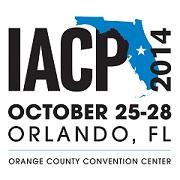Standing Room Only Workshops at IACP
 From post-traumatic stress disorder to incendiary images on YouTube, the COPS Office explored the most pressing issues facing law enforcement executives today at the 2014 International Association of Chiefs of Police (IACP) conference, the oldest and most prestigious conference of its kind, held in Orlando, Florida, October 25 to 28.
From post-traumatic stress disorder to incendiary images on YouTube, the COPS Office explored the most pressing issues facing law enforcement executives today at the 2014 International Association of Chiefs of Police (IACP) conference, the oldest and most prestigious conference of its kind, held in Orlando, Florida, October 25 to 28.
At the conference, the IACP was addressed by the nation’s top law enforcement officials, Attorney General Eric H. Holder and FBI Director James Comey. COPS Office Director Ron Davis spoke at the plenary session, where he discussed street crime, as well as in several committee meetings.
More than 16,000 law enforcement executives from 84 countries attended, many of whom also came to the fourteen workshops sponsored by the COPS Office. There were capacity crowds in most of them—standing room only in some. And no wonder. According to COPS Office Senior Social Science Analyst John Markovic, whose workshop on evidence-based crime prevention and predictive policing drew a large audience, “The topics we covered were all issues that are front and center now.”
Procedural Justice, Managing in a Tight Economy, Preventing Hate Crimes, and More
Filling every seat and lining the walls, the audience for “Establishing Procedural Justice within Police Organizations” learned about institutionalizing procedural justice at every level of the organization. Moderated by Senior Policy Analyst Melissa Bradley, the panelists shared their expertise on organizational transformation through a procedural justice frame and also discussed building trust within communities. The panelists shared thoughts on how to change mindsets from 'can I do this' to 'should I do this' and on how to take the pulse of the community.
Another well-attended COPS Office presentation was “Chief’s Dilemma: Resources Decrease, Demands Increase—How to Respond.” Led by Senior Social Science Analyst Nazmia Comrie, it offered practical solutions for delivering services and managing agencies under tight budgets.
The COPS Office also hosted a poster session, “Preventing Hate Crimes and Building Bridges,” which presented solutions for preventing and responding to hate crimes. The solutions and promising practices are rooted in identifying these crimes, reaching targeted populations, and enlisting government support.
Addressing Sensitive Topics and Controlling Social Media
In partnership with the National Alliance on Mental Illness, the COPS Office also presented a workshop titled “Addressing Post-Traumatic Stress Disorder Among First Responders After Mass Casualty Events,” which discussed best practices for effective intervention after a traumatic event, focusing on law enforcement as well as community members and other first responders.
A session which not only attracted a large crowd but also generated a lot of activity on Twitter was the “Officer Suicide Initiative.” Supervisory Senior Social Science Analyst Deborah Spence commented, “This was a ground-breaking meeting for a lot of people, addressing an issue that many in law enforcement don’t feel comfortable with. We felt it was important to discuss it openly—because we can’t prevent what we can’t acknowledge.”
Another topic which has gripped the attention of police agencies was the subject of “Events with the Potential to Go Viral.” A panel discussion led by chiefs of police from Los Angeles, Milwaukee, and Toronto and moderated by Senior Policy Analyst Melissa Bradley, it explored methods of responding to traditional and social media coverage using case studies to highlight best practices.
Addressing Critical Concerns of National and International Law Enforcement
The COPS Office table in the exhibit hall was also a hit with conference attendees. Said Program Analyst Danielle Ouellette, “The brochures and CDs almost flew off the table. Thousands were picked up.” The first to go were the postcards describing the LEO Near Miss Reporting System, which encourages police to report situations so that others can learn from their experience.
About 140 different titles were distributed, including publications on such far-ranging topics as body-worn cameras, community policing resources, methamphetamine resources, and police recruitment and hiring. Ms. Ouellette also noted that many international attendees, from countries such as Switzerland, Belgium, and Nigeria, requested publications.
Overall, it was a very successful event for community policing. Asked about the high level of attendance at the COPS Office workshops, Ms. Spence noted “The great thing about seeing so many people in our workshops is that it reinforces our belief that we are helping the field address issues that are critical to them.”
Faye Elkins
Special Contributor
The COPS Office
Shining a Light on Hidden Disabilities | Eyewitness ID Best Practices | Truck Tire Theft | COPS Office at IACP | Protecting Yourself on Holiday Travel | The COPS Office top 10 must-reads of 2014 | Building Trust in Communities of Color
